My Heart Is a Chainsaw / Stephen Graham Jones
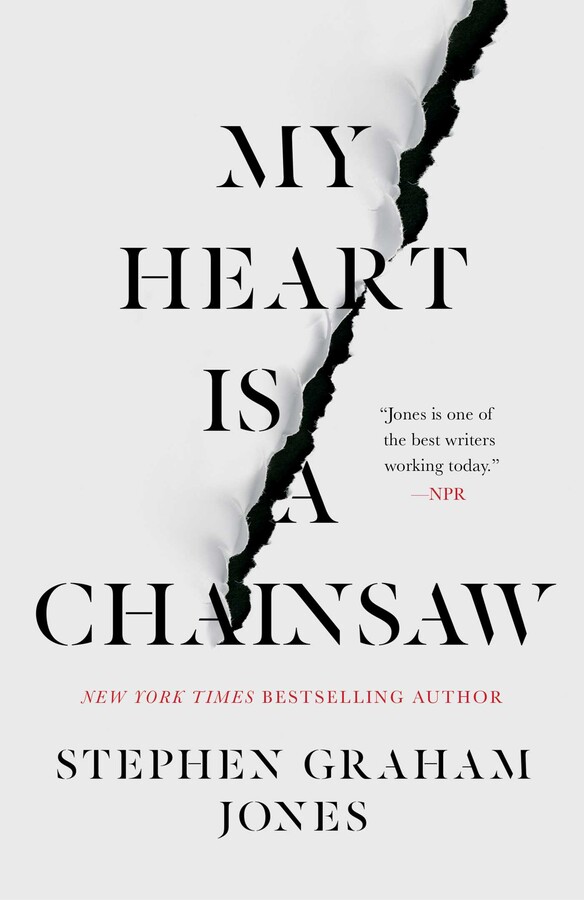 Saga Press / August 2021
Saga Press / August 2021
Reviewed By: Vince A. Liaguno
All roads lead to somewhere, and if you’ve traveled the Stephen Graham Jones literary highway for as long as this reviewer has, you’ll know that My Heart Is a Chainsaw, the Bram Stoker Award® winner’s latest, has been the destination all along. From his earliest meta-filled works like Demon Theory to his literary flirtations with the often scoffed-at horror subgenre he unapologetically loves like The Night of the Mannequins and The Last Final Girl, Jones finally brings both his adoration and encyclopedic knowledge of the slasher genre full circle. My Heart Is a Chainsaw is but the first of many pinnacles in a career that’s just finally beginning to get the mainstream attention and accolades it so richly deserves.
Jade Daniels, the novel’s exceedingly flawed but lovable protagonist, is the quintessential high school outcast. Living in the economically-depressed Idahoan town of Proofrock, Jade is the product of an absent mother and abusive, alcoholic Indigenous father, which renders her a survivor from the start. More at home with her beat-up VCR and stash of beloved 80s-era slasher films than people, Jade views her daily life in Proofrock through a kaleidoscope of slasher movie reference points. The banality of her life is punctuated by a dead-end custodian job at the high school from which she’s kinda-sorta just graduated and her frequent run-ins with the town’s sheriff. Only when a new luxury community called Terra Nova begins to go up on the other side of the town’s aptly-named Indian Lake—here the stand-in for the railroad tracks that usually separate the haves from the have-nots—does Jade’s predicted life course take a detour.
When two Dutch tourists are killed in grisly fashion on Indian Lake, Jade recognizes what no one else does—or even can: A new slasher cycle has commenced. Through the lens of her exhaustive knowledge of the slasher genre, Jade predicts and tries to warn of what’s to come. Trouble is no one’s listening to the notoriously troubled town rebel at the outset. Eventually, Jade convinces Letha Mondragon, daughter of one of Terra Nova’s founding gentrificationists, that not only has a slasher come to Proofrock but that she’s identified Letha as the archetypal final girl in this real-life narrative.
Although the plot takes all the requisite twists and turns leading up to the anticipated unleashing of the promised slasher mayhem, Jones uses his expertise and familiarity with the genre to brilliantly deviate from what’s expected, giving readers both a sly subversion and brilliant deconstruction of the genre in the process. Even amidst a hefty body count, Jones finds and elevates the humanity of the story through Jade, who is the composite of every final girl we’ve ever encountered in one of these films. He celebrates her resiliency and crafts a transformation that feels authentic and every bit deserved.
Jones wears his love of the slasher movie on his sleeve—make that both sleeves—in My Heart Is a Chainsaw. From the slasher-named chapters to a series of cleverly placed essays on films and tropes of the genre that masquerade as the extra credit history papers Jade needs to graduate, Jones paints the pages of Chainsaw a bright slasher red. And while there’s a cool in-crowd vibe to this generous layering of Easter eggs for his slasher brethren, Jones wisely crafts a compelling narrative that doesn’t exclude even the most casual of readers who perhaps aren’t as familiar with the novel’s slasher leanings. Still, Chainsaw is less a meta-deconstruction of the genre than it is a self-referential submersion into it. In other words, readers aren’t one of the partygoers listening to Randy’s dissertation on the rules for surviving a horror movie in Wes Craven’s Scream; they’re a character in the virtual reality of the movie itself, learning the rules as they run, scream, and try to hide from the maniacal killer. Like Jade, they’re trying to stay one step ahead—only to have the rug pulled out from under them again and again. Ultimately, knowledge is survival.
Layered in among the carnage, Jones seamlessly weaves a broader social commentary on the insidiousness of colonialism, gentrification, and environmental destruction into his narrative, saving some of his harshest criticism—here doled out in the form of bloody slaughter with everything from machetes to nail guns—for the arrogance of capitalism and the microaggressiveness of entitlement. In the hands of a lesser writer, injecting this type of weighty subject matter into a thriller plot could spell a pacing disaster; thankfully, Jones lands his punches and blackens a few eyes without knocking anyone out in the process.
Part homage to a beloved film genre, part coming-of-age story, My Heart Is a Chainsaw is Stephen Graham Jones at his most accomplished. With a finely-cultivated distinctiveness in voice, Jones cements his reputation as a master storyteller. It’s a triumphant novel of breakneck pacing and ingenious construction told through the eyes of a damaged heroine who finds solace—and, ultimately, salvation—in the same films that bring so many of us of a certain age a reassuring sense of nostalgic comfort. While the violence inherent in the slasher film may be an odd choice from which to derive such sense of redemption and wellbeing, Jones knows it so intimately that he’s able to simultaneously convey and dispel its illogic as a therapeutic agent of healing, proving himself a literary virtuoso.
Purchase My Heart Is a Chainsaw by Stephen Graham Jones here.
The Man from Milwaukee / Rick R. Reed
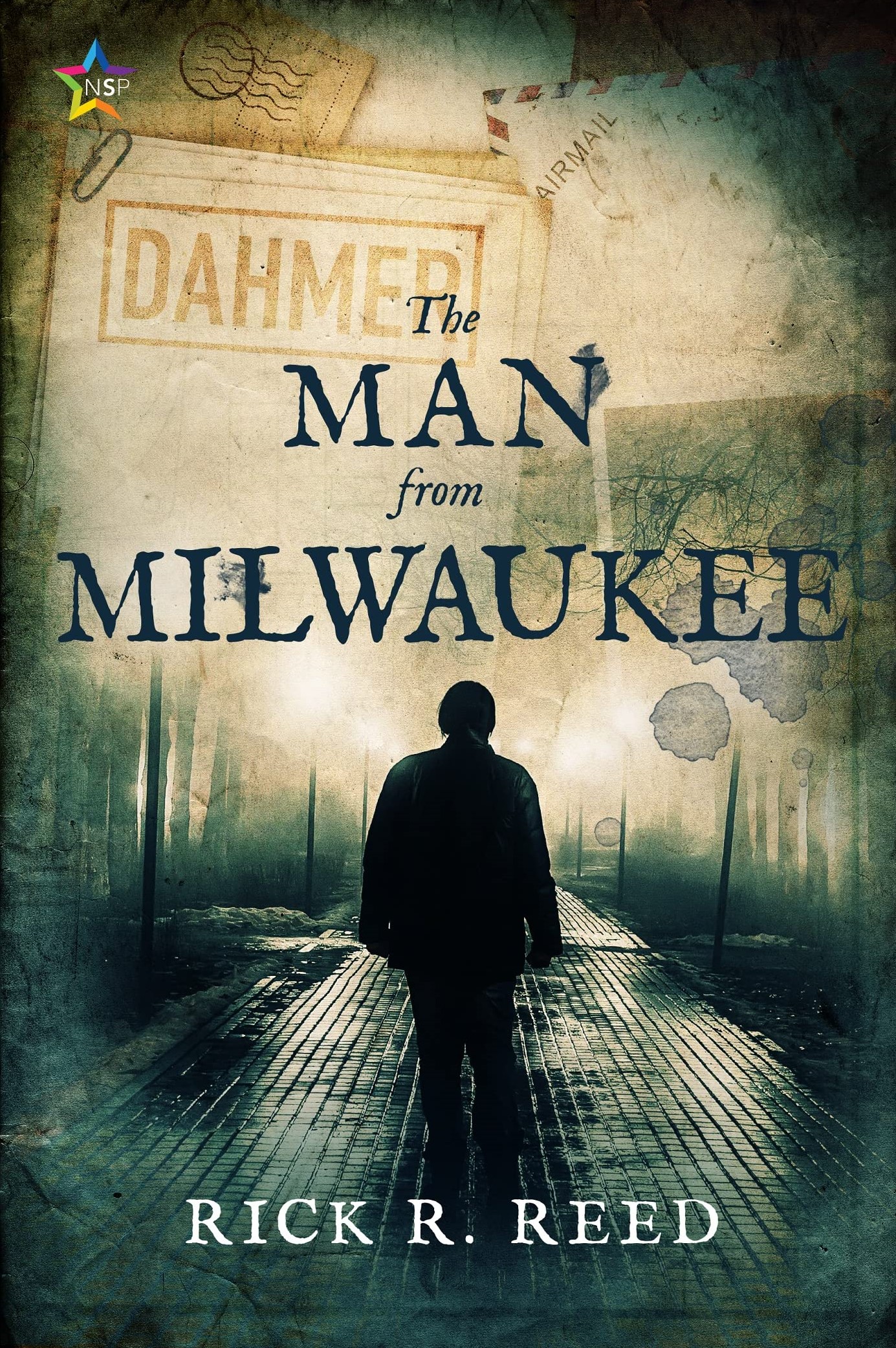 NineStar Press / July 2020
NineStar Press / July 2020
Reviewed By: Vince A. Liaguno
Rick R. Reed returns to his horror roots with The Man from Milwaukee, a surprisingly fresh thriller about obsession, trauma, and—ultimately—the redemption of forgiveness. It’s 1991 and notorious serial killer and cannibal Jeffrey Dahmer has just been apprehended by authorities. Chicagoan Emory Hughes, a glum, closeted gay man working a dead-on job at an insurance company, becomes fascinated by the news reports of Dahmer’s crime spree. Amidst a truly cheerless life that includes caring for his bedbound, AIDS-stricken mother and struggling through a strained relationship with his recalcitrant sister, Emory’s fascination turns into an obsession that manifests in a macabre pen pal relationship with Dahmer in prison. When an openly gay younger man named Tyler Kay comes to work at the insurance company and strikes up a relationship with the introverted Emory, the older man is forced to confront his inner demons, with deadly consequences.
Reed gets major props for taking The Man from Milwaukee in unexpected directions several times throughout the novel. In the hands of a lesser writer, any story about a sexually repressed gay man obsessed with Jeffrey Dahmer would play out in predictable and gruesome ways. But Reed, a veteran of multiple genres, shrewdly layers in some interesting twists and turns—and when you think the story is going left, he unexpectedly banks right. He fashions his novel more of a character study of Emory and, not unlike Stephen King did with Annie Wilkes in Misery, imbues his villain with humanity. In the process, he manages a feat not many writers can pull off: He makes Emory a genuinely sympathetic villain. While readers are rooting for a good outcome for Tyler, they’re also hoping that Emory gets some redemption by story’s end.
With The Man from Milwaukee, Reed never sacrifices tension or that pervasive sense of dread. Bad things happen in this book, which leads readers to believe that characters—especially Tyler—are in grave danger. But where other thrillers increasingly accelerate from 0 to 60 mph and follow the highway straight to the cliff’s edge and over, Reed isn’t afraid to take his foot off the gas at unexpected places in his narrative or turn down a side road on occasion. It a narrative device that makes for a less conventional reading experience, keeping readers just enough off balance without throwing them for the total loop.
Secondary characters are used judiciously, never clogging up Reed’s straightforward plot, which has Tyler on a collision course with Emory’s descent into madness. Emory’s sister, Mary Helen, figures more prominently in the novel’s third act, and her character arc is one of the many pleasant and unpredictable joys of this otherwise dark work of fiction. At story’s end, the characters who make it through grapple with the cost of trauma, the toll of loneliness, and the price of forgiveness. It’s here where Reed brings his well-paced, engrossing tale to yet one last surprising turn in the narrative road, one certain to leave readers thinking about The Man from Milwaukee for days after closing the book.
Purchase The Man from Milwaukee by Rick R. Reed here.
The Bright Lands / John Fram
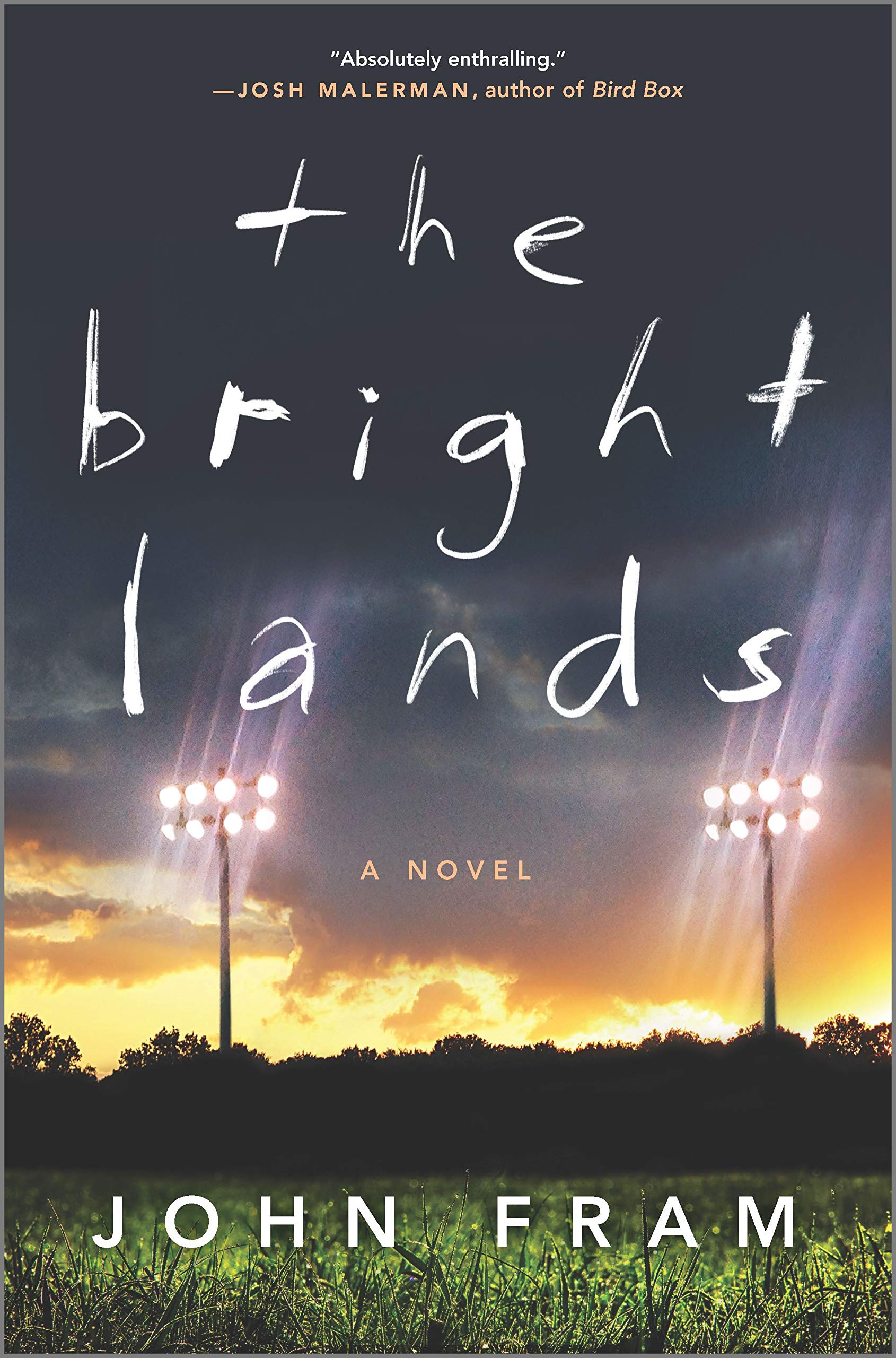 Hanover Square Press / July 2020
Hanover Square Press / July 2020
Review by: Vince A. Liaguno
There’s nothing more dangerous than a small town with big secrets. For Joel Whitley, the marvelously flawed protagonist in John Fram’s equally marvelous literary debut The Bright Lands, those secrets take a personal toll that catapults him through a propulsive, twisty sequence of events. After the disappearance of his younger brother—star quarterback of the hometown football team—forces him to return to the conservative Texas town from which he was shamefully driven a decade prior, Joel teams up with Sheriff’s Deputy Starsha Clark, for whom Joel’s return brings up her own uneasy memories of her brother who also disappeared years earlier. As the two dig deeper into the secrets running beneath the grounds of Bentley—literally and figuratively—the novel skillfully ratchets up a degree of tension that belies the fact that this is a debut novel. What follows is a tightly-written, compelling novel that’s part Varsity Blues, part <insert name of favorite Stephen King small-town evil novel here>, mixed with the sexy melodrama of an early Christopher Rice novel.
Nightmarish dreams of the titular locale and eerie whispers transition Fram’s novel from police procedural to supernatural thriller that remains anchored in the reality of human deception, addiction, homophobia, and murder. The paranormal elements—at times—seem unnecessary and leave one wondering if they were wholly essential to telling the story. For this reviewer, Fram is at his strongest when he’s shining an uncomfortable light on the generational damage and sadness of small-town high school athletics, in which testosterone-fueled adolescent boys achieve a quasi-celebrity status that never translates into adulthood for most. In Fram’s capable hands, the insularity of these dead-end towns that nurture dead-end futures for the sake of small-town pride in the athletic prowess of its young men is the real achievement here, one that imbues The Bright Lands with a pervasive sense of melancholy because we know people like these characters—narrow-focused boys who pin their futures on longshot dreams of the big leagues who become disillusioned grown men who relive their glory days in a looping reel in between menial jobs that don’t afford them one iota of the life they once dreamt of, starry-eyed and confident in their youth.
Fram perfectly captures small town ennui while illustrating how deep the darkness of corruption can run beneath the surface of Mayberry ordinariness. The theme of toxic masculinity weighs heavily here, and Fram does a respectable job exploring this modern societal problem from the perspectives of several characters, which allows him to do so with scope and breadth. There’s also a perceptive examination of the power of generational fraternity and how that power is fueled by domineering men for whom authority, influence, privilege, and entitlement can converge into a potent—and oppressive—force.
The sheer hedonism of the novel’s action-packed climax may be jarring for some. I’m hard-pressed to remember a debut novel that’s as unabashed in its queerness since Christopher Rice’s literary bow with A Density of Souls back in 2000. Fram lets loose here in the third act and shows the ugliness of sexual repression in its many forms—including adult authority figures using money, drugs, and coercion to lure underage male victims.
John Fram’s The Bright Lands is an impressive debut novel, a first-rate work of southern gothic fiction that never lets its socio-political underpinnings overwhelm the storytelling at its heart. The central mystery at its core is the book’s driving force for an overall engaging cast of characters, and Fram nails the sweltering, dust-bowl Texas setting so well that the town of Bentley becomes a key character in and of itself. An enthralling thriller with horror overtones, The Bright Lands is a harbinger of great things to come from a promising new voice in literary fiction.
Purchase The Bright Lands by John Fram here.
Elegy for the Undead / Matthew Vesely
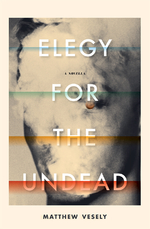 Lanternfish Press / October 2020
Lanternfish Press / October 2020
Reviewed by: Vince A. Liaguno
Literary debuts come in all sizes—some arrive with big and buzzy fanfare; others slip in quietly, unobtrusively. Although Matthew Vesely’s Elegy for the Undead falls squarely into the latter category, this stunning novella marks the introduction of a voice worth keeping an ear out for. What makes Elegy even more impressive is that it takes a weary pop culture phenomenon—zombies—and makes every one of the subgenre’s tropes seem fresh when backlit against the heartrending humanity of Vesely’s story.
Jude and Lyle, the protagonists at the heart of Elegy, are just your typical queer newlyweds juggling life, love, and careers when a zombie apocalypse upends life as they know it. Told in alternating flashbacks and time jumps from both Jude’s and Lyle’s points of view, we follow the couple through their circumspect courtship to marriage, from settling down and establishing a home in suburbia to navigating flesh-eating neighbors. One of them is bitten, infecting him with a virus that causes violent episodes and a gradual physical and mental deterioration. Although antivirals slow the progression of this newly-emergent disease, both men understand the progression of the illness and how it ends—death followed by reanimation followed by compassionate euthanasia.
Vesely’s story is masterfully paced, with the flashback and time-jump narrative devices used with a careful precision that builds tension, suspense, and emotional investment in his characters. Mini cliffhangers abound, propelling readers to turn pages quicker and quicker to find out what happened and what’s next. Although Elegy is a lean 171 pages of storytelling, the reader never feels rushed or cheated; Vesely tells the couple’s story completely.
The zombie infection in Elegy is, quite clearly from the outset, an allegorical stand-in for any number of degenerative diseases that robs its victim of their personhood—Alzheimer’s and ALS spring most immediately to mind—but Vesely’s tale never suffers for that obviousness; conversely, the universal familiarity of grappling with a malignancy that advances toward an inevitable end lends an emotional gravitas to the usual once bitten/twice dead body count apathy of zombie tales. Think about why Train to Busan or the earlier episodes of The Walking Dead resonated so deeply with audiences and stood out in an otherwise one-note subgenre and you’ll understand why Vesely’s tale is so special.
In Elegy for the Undead, newcomer Matthew Vesely has crafted a deceptively simple tale of love in the age of zombies; but look closer and you’ll find a beautifully nuanced tale of the complexities of human connection and an affecting rumination on anticipated grief. No surprise either that Elegy comes from Lanternfish Press, an impressive boutique publisher of other compelling, strange literary birds. It’s a novella of breathtaking achievement that one could easily imagine being adapted for the screen by an equally gifted visual storyteller like Osgood (I Am the Pretty Thing That Lives in the House, The Blackcoat’s Daughter) Perkins or Carter (Jamie Marks is Dead, Bugcrush) Smith and then becoming a breakout hit on the film festival circuit.
Purchase Elegy for the Undead by Matthew Vesely here.
A Soundless Dawn / Dustin LaValley
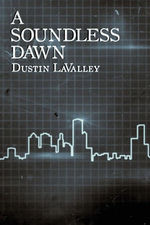 Sinister Grin Press / March 2017
Sinister Grin Press / March 2017
Reviewed by: Vince A. Liaguno
With A Soundless Dawn, Dustin LaValley has crafted a lean collection of 41 flash fiction and short stories that defies classification—a blend of horror and neo-noir and literary fiction that’s as eclectic and wholly original as anything you’re likely to find on bookstore shelves. LaValley masterfully plays with story structure, allowing him to toy with readers’ expectations. The offerings in A Soundless Dawn never let the reader commit, like a ride through the dark that turns sharp left when you expect to go right—a literary Space Mountain.
The collection has a discernible rhythm—like literary music set to a beat of two micro-shorts punctuated by a proper short story. Some of the tales here have a vague whiff of autobiography; others are relentlessly bleak, with an air of unrequitedness being one of the more pervasive themes. LaValley executes a cunning examination of the human condition—sometimes in a mere sentence or two—exploring the tolls of homelessness, drugs, lust, displacement, insomnia, and violence on the soul. Most of the stories in A Soundless Dawn eschew focus on the outward effects of these things and concentrate on what they do to the essence of a person. And therein lies the strength of LaValley’s deceptively slim collection.
The best tales in A Soundless Dawn are disorienting (“Picture-in-Picture,” “Awake and Dreaming”) or the superb “Used,” in which the unnamed narrator’s heightened olfactory senses tell the story of a used book’s former owner.
“Sand Bucket”—which is both jarringly out of place here and perfectly suited for this collection—is a gorgeous short story about a little boy’s imaginary friend that manifests in a bucket of sand. It’s a heartbreaker that will sucker punch you with its emotion as it explores, first, the anguish of parents trying to cope with a child’s mental illness and, then, their acceptance of it. It’s a heartrending, elegiac tale about unconditional love and the standout of the collection.
In his introduction to A Soundless Dawn, Edward Lee posits that formula in genre fiction equals familiarity; consequently, familiarity equals trust. Readers will find little formula here, even less familiarity, and almost nothing tangible to trust in LaValley’s capable hands. Like other contemporary literary outlaws—I’m thinking of Dennis Cooper’s uncomfortable blend of sex and violence or Joyce Carol Oate’s rejection of the linear narrative or Stephen Graham Jones’ masterful blending of disparate structures and experimental forms—LaValley earns the title handily with this illuminating and genuinely transgressive collection.
Purchase A Soundless Dawn by Dustin LaValley here.
She Lies In Wait / Gytha Lodge
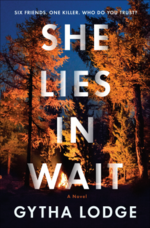 Random House / January 2019
Random House / January 2019
Reviewed by: Vince A. Liaguno
Lodge’s debut thriller—the first of a proposed series—centers on an ill-fated camping trip and its shattering aftermath. It’s a hot summer night in July of 1983 when seven high school friends go deep into the woods camping in southeast England. There’s booze and drugs, some sexual hook-ups and at least one unrequited love. By morning, one of the group—Aurora Jackson, the youngest—has disappeared without a trace. Despite the teens calling for help and a massive and exhaustive police-led volunteer search—complete with cadaver dogs—the young girl is never found.
Flash forward thirty-odd years later and a random discovery leads to Aurora’s bones being unearthed in a secret concave hideaway only the six friends knew about near the campsite where she disappeared. Enter Detective Chief Inspector Jonah Sheens, who was an upstart policeman when Aurora first went missing. He’s assigned to the cold case-now-warmed with his investigative team that includes Detective Constable Juliette Hanson, the newest member of the team, Detective Sergeant Domnall O’Malley, and Detective Constable Ben Lightman. Adding to the intrigue is the fact that Sheens knew the teens, at least peripherally, from high school. Suffice to say that secrets abound as DCI Sheens and his team wade through a convoluted web of misdirection and a decades-old conspiracy of silence amongst the group of friends, now marvelously flawed adults.
Lodge chooses to tell her tale from the perspectives of multiple characters along the way, but the narrative is primarily arranged in alternating chapters between the present-day investigation as seen through the eyes of Sheen and that fateful first night in the woods told through Aurora’s point of view. Lodge does an excellent job of presenting her modest suspect list as a series of engrossing character studies of the surviving teens—each grappling with the psychological aftereffects of that fateful night in light of its present-day outcome, long-suppressed memories that have proven unreliable with the passage of time, and petty resentments not uncommon in groups of lifelong friends.
Fans of police procedurals will delight in the abundance of suspect interrogations, as well as the interactions and debriefings amongst Sheens’ team that provide a glimpse into the inner workings of such law enforcement machines. Lodge’s plotting is intricate and, more importantly for mystery lovers, holds together in terms of logic even through the requisite twists and turns and red herrings, all of which are competently executed here. She misfires—albeit slightly—with two subplots involving Sheens and Hanson that feel wholly unnecessary to the larger narrative but one should take this minor criticism with a grain of salt in consideration that She Lies In Wait is a series launch.
She Lies In Wait will likely appeal to both thriller fans and those mystery lovers who relish a worthwhile whodunit. Lodge creates a sympathetic—tragic, even—victim in Aurora Jackson and readers may (surprisingly) find themselves welling up with emotion in the novel’s beautifully executed closing paragraphs. DCI Sheens and crew are likable and interesting enough—Lightman, especially, leaves me wanting to know more—to warrant further adventure, even if Lodge’s suspects may not elicit much sympathy from readers over the course of this first murder mystery.
Purchase She Lies In Wait by Gytha Lodge.
An Unwanted Guest / Shari Lapena
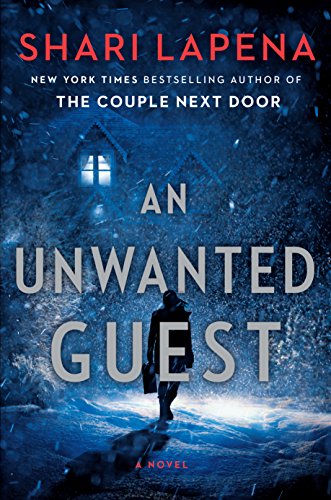 Pamela Dorman Books / August 2018
Pamela Dorman Books / August 2018
Reviewed by: Vince A. Liaguno
Any mystery writer who takes on the locked-room mystery formula of Agatha Christie rolls the dice. Sometimes, the roll gives them a winner—oftentimes not. So when Shari Lapena—fresh off the success of two well-received breakout novels, The Couple Next Door and A Stranger in the House—takes on an obvious homage to Christie’s classic And Then There Were None, you find yourself holding your breath as the dice roll down the table.
Her classic set-up is as comforting as it is familiar—ten guests arrive at a quaint (and quite isolated) mountain lodge in the Catskills where a crippling weather event (here a blizzard and ice storm) cuts them off from the outside world. Someone dies in what first appears to be an accident. Then someone else dies in what is decidedly not an accident and the stranded guests—tended to by a father-son team of innkeepers—realize that a murderer walks among them. Misplaced suspicions and character reveals stoke the fires of paranoia. The bodies continue to pile up until the power is restored and the local law enforcement can be called in just in time for the drawing room denouement.
Lapena—like myriad writers before her—proves that a dozen cooks can use the same ingredients and follow the same recipe but still end up with twelve slightly different dishes. While she ably sets the scene in An Unwanted Guest, her execution veers off somewhere in the second act, all but derailing the third. Her ensemble of weekend guests are distinguishable enough from one another, but none of them truly stands out. This makes the key hook for readers—a character with whom they sympathize and can root for—lacking here. With no one to cheer on, readers may find themselves bumbling around as aimlessly as her characters do once the requisite power fail kills the lights.
With An Unwanted Guest, it almost seems like Lapena wanted to write a serious locked-room mystery but then changed her mind midway through and decided she should go the thriller route. As such, her pacing is on-point, with shorter passages told from various characters’ points of view lending momentum and allowing her to slow things down or quicken the pace when she needs to. She ably layers in a red herring or two that momentarily diverts the reader’s attention, but ultimately she misses the mystery mark by failing to make it possible for readers to solve the mystery themselves. The third-act reveal seems rushed, with motive and backstory dumped out unceremoniously and as fast as the killer is handcuffed. One assumes this is to make way for the big twist—something of a “must” now in psychological thrillers and quickly becoming a trope in and of itself—but even that the reader will see coming from a mile away.
An Unwanted Guest is like a beautifully formatted essay that, ultimately, makes no point. Taken strictly as an homage to Christie’s classics, it works better—but even then only slightly because of its mediocre third act. You’ll find yourself happy you made it for the party but ultimately disappointed that you didn’t get out before the roads got too bad to leave.
Purchase An Unwanted Guest by Shari Lapena.




